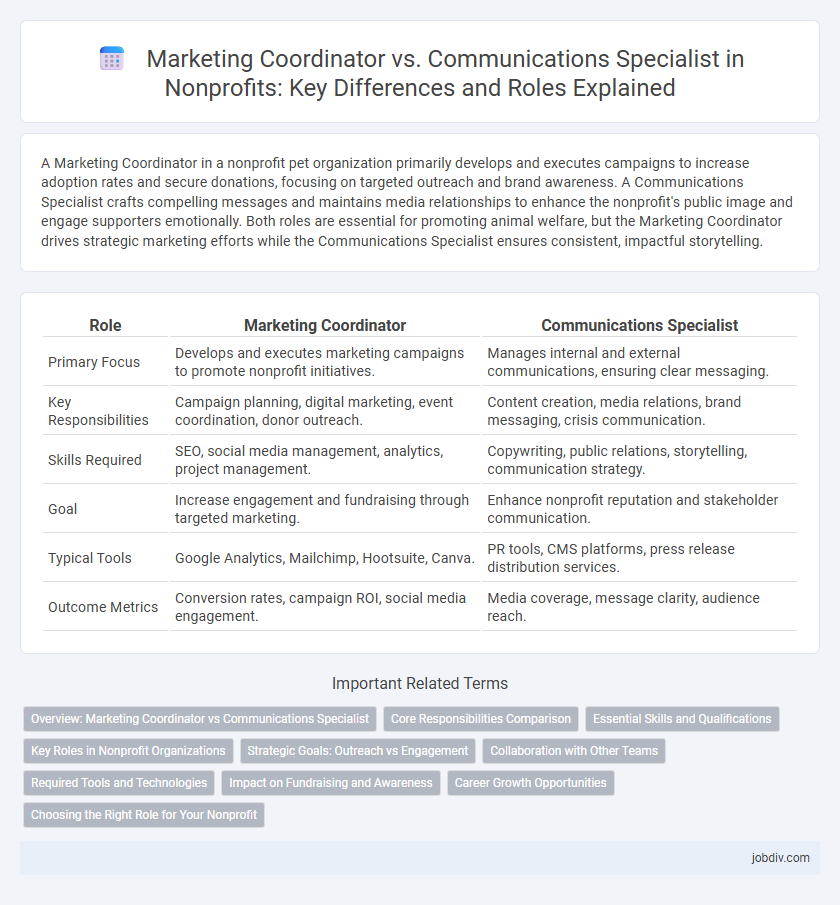A Marketing Coordinator in a nonprofit pet organization primarily develops and executes campaigns to increase adoption rates and secure donations, focusing on targeted outreach and brand awareness. A Communications Specialist crafts compelling messages and maintains media relationships to enhance the nonprofit's public image and engage supporters emotionally. Both roles are essential for promoting animal welfare, but the Marketing Coordinator drives strategic marketing efforts while the Communications Specialist ensures consistent, impactful storytelling.
Table of Comparison
| Role | Marketing Coordinator | Communications Specialist |
|---|---|---|
| Primary Focus | Develops and executes marketing campaigns to promote nonprofit initiatives. | Manages internal and external communications, ensuring clear messaging. |
| Key Responsibilities | Campaign planning, digital marketing, event coordination, donor outreach. | Content creation, media relations, brand messaging, crisis communication. |
| Skills Required | SEO, social media management, analytics, project management. | Copywriting, public relations, storytelling, communication strategy. |
| Goal | Increase engagement and fundraising through targeted marketing. | Enhance nonprofit reputation and stakeholder communication. |
| Typical Tools | Google Analytics, Mailchimp, Hootsuite, Canva. | PR tools, CMS platforms, press release distribution services. |
| Outcome Metrics | Conversion rates, campaign ROI, social media engagement. | Media coverage, message clarity, audience reach. |
Overview: Marketing Coordinator vs Communications Specialist
Marketing Coordinators in nonprofits manage campaign logistics, coordinate outreach efforts, and analyze audience engagement metrics to optimize fundraising and awareness initiatives. Communications Specialists focus on crafting clear, consistent messaging across multiple platforms, maintaining media relations, and enhancing public perception of the nonprofit's mission. Both roles are essential for driving donor engagement and supporting organizational goals through strategic communication and marketing execution.
Core Responsibilities Comparison
Marketing Coordinators in nonprofits primarily oversee campaign planning, market research, and promotional activities to drive donor engagement and fundraising efforts. Communications Specialists focus on crafting press releases, managing social media content, and maintaining public relations to enhance the organization's brand and stakeholder awareness. Both roles require collaboration with internal teams but differ in their emphasis on strategic marketing execution versus message development and media relations.
Essential Skills and Qualifications
Marketing Coordinators in nonprofits excel in project management, data analysis, and strategic campaign development, with expertise in digital marketing tools and audience segmentation. Communications Specialists demonstrate strengths in content creation, media relations, and storytelling, possessing skills in public speaking, press release writing, and multimedia production. Both roles require proficiency in social media platforms, strong organizational skills, and adaptability to evolving nonprofit communication trends.
Key Roles in Nonprofit Organizations
Marketing Coordinators in nonprofit organizations focus on campaign development, targeting donor engagement and fundraising outreach through strategic marketing plans and digital content management. Communications Specialists prioritize crafting and managing the organization's narrative, including press releases, social media communication, and stakeholder relations to enhance public image and support mission-driven goals. Both roles collaborate to increase visibility and donor support, yet Marketing Coordinators emphasize market analysis and promotional tactics while Communications Specialists concentrate on message consistency and media outreach.
Strategic Goals: Outreach vs Engagement
Marketing Coordinators in nonprofits primarily drive outreach by developing targeted campaigns and expanding donor and volunteer networks to meet strategic growth goals. Communications Specialists focus on engagement through crafting compelling narratives and managing multi-channel content that fosters deeper relationships with stakeholders. Aligning these roles strategically enhances both awareness and sustained involvement critical to nonprofit success.
Collaboration with Other Teams
Marketing Coordinators in nonprofits collaborate closely with development and events teams to align campaign strategies and maximize fundraising efforts. Communications Specialists work alongside program managers and media relations staff to craft consistent messaging and enhance public engagement. Both roles require seamless teamwork to ensure cohesive outreach and amplify the organization's mission impact.
Required Tools and Technologies
Marketing Coordinators in nonprofits primarily use Customer Relationship Management (CRM) systems, email marketing platforms like Mailchimp, and social media management tools such as Hootsuite to plan and execute campaigns. Communications Specialists rely heavily on content management systems (CMS) like WordPress, graphic design software including Adobe Creative Suite, and media monitoring tools like Cision to craft and distribute organizational messaging. Both roles require proficiency in analytics tools such as Google Analytics to measure campaign effectiveness and audience engagement.
Impact on Fundraising and Awareness
Marketing Coordinators organize targeted campaigns that increase donor engagement and optimize fundraising channels, directly enhancing revenue streams for nonprofits. Communications Specialists craft compelling narratives that elevate brand awareness and strengthen relationships with stakeholders, boosting volunteer involvement and community support. Both roles synergize to maximize overall impact, driving sustainable growth and mission fulfillment through strategic outreach efforts.
Career Growth Opportunities
Marketing Coordinators in nonprofits often gain broad skills in campaign management, digital marketing, and donor engagement, positioning them for leadership roles in fundraising or marketing departments. Communications Specialists typically develop expertise in media relations, content creation, and brand messaging, enabling advancement into strategic communications or public relations management. Both roles offer distinct career growth opportunities by building critical competencies aligned with nonprofit mission-driven outreach and stakeholder engagement.
Choosing the Right Role for Your Nonprofit
Marketing Coordinators in nonprofits focus on campaign strategy, donor engagement, and event promotion, driving visibility and fundraising efforts through data-driven marketing channels. Communications Specialists prioritize managing public relations, crafting messaging, and maintaining media relations to enhance organizational reputation and stakeholder trust. Selecting the right role depends on your nonprofit's immediate needs--opt for a Marketing Coordinator if your goal is expanding outreach and donations, or a Communications Specialist to strengthen brand narrative and media presence.
Marketing Coordinator vs Communications Specialist Infographic

 jobdiv.com
jobdiv.com